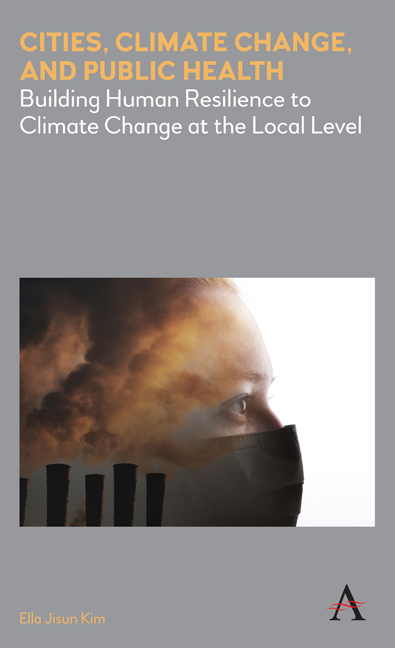 Cities, Climate Change, and Public Health
Cities, Climate Change, and Public Health Book contents
- Frontmatter
- Dedication
- Contents
- List of Figures and Tables
- Acknowledgments
- Chapter 1 Introduction
- Chapter 2 Cities, Climate Change, and Public Health
- Chapter 3 Collective Climate Adaptation at the Local Level
- Chapter 4 Framing Climate Change as a Public Health Issue
- Chapter 5 Role-Play Simulations
- Chapter 6 Digital Games
- Chapter 7 Role-Play Simulations versus Digital Games
- Chapter 8 Discussion and Policy Recommendations
- Appendix A Issue Framing Vignettes
- Appendix B Issue Framing Survey Questions
- Appendix C Role-Play Simulation Before-Survey Questions
- Appendix D Role-Play Simulation After-Survey Questions
- Appendix E Role-Play Simulation Facilitator Questionnaire
- Appendix F Role-Play Simulation Debriefing Script
- Appendix G Role-Play Simulation Post-Game Interview Questions
- Appendix H Role-Play Simulation Workshop Sample Characteristics
- Appendix I Digital Game Before-Survey Questions
- Appendix J Digital Game After-Survey Questions
- Appendix K Digital Game Post-Game Interview Questions
- Appendix L Digital Game Sample Characteristics
- References
- Index
Chapter 5 - Role-Play Simulations
Published online by Cambridge University Press: 06 May 2020
- Frontmatter
- Dedication
- Contents
- List of Figures and Tables
- Acknowledgments
- Chapter 1 Introduction
- Chapter 2 Cities, Climate Change, and Public Health
- Chapter 3 Collective Climate Adaptation at the Local Level
- Chapter 4 Framing Climate Change as a Public Health Issue
- Chapter 5 Role-Play Simulations
- Chapter 6 Digital Games
- Chapter 7 Role-Play Simulations versus Digital Games
- Chapter 8 Discussion and Policy Recommendations
- Appendix A Issue Framing Vignettes
- Appendix B Issue Framing Survey Questions
- Appendix C Role-Play Simulation Before-Survey Questions
- Appendix D Role-Play Simulation After-Survey Questions
- Appendix E Role-Play Simulation Facilitator Questionnaire
- Appendix F Role-Play Simulation Debriefing Script
- Appendix G Role-Play Simulation Post-Game Interview Questions
- Appendix H Role-Play Simulation Workshop Sample Characteristics
- Appendix I Digital Game Before-Survey Questions
- Appendix J Digital Game After-Survey Questions
- Appendix K Digital Game Post-Game Interview Questions
- Appendix L Digital Game Sample Characteristics
- References
- Index
Summary
Serious Games and Climate Change
Social barriers to climate adaptation primarily operate at the individual and collective decision-making levels (Hulme et al. 2007). For instance, at the individual level, a perceived lack of self-efficacy may hinder some from preparing for climate change. At the collective level, climate adaptation planning and policymaking tends to be characterized by a status quo bias, often catalyzed by the lack of perceived collective efficacy (Bandura 1998; Hulme et al. 2007). In response to these deep-seated personal and collective barriers to climate adaptation, Rumore et al. (2016) argue for the need to enhance communities’ readiness to adapt to climate change. In their view, acquiring substantive knowledge, or what they call adaptation literacy, at both the individual and community level, is necessary but not sufficient for a community to achieve climate readiness. Collaborative capacity, or the ability to work together to solve common problems, is key (Rumore et al. 2016). A ready community would possess a “shared sense of the risks that communities collectively face, how they might prepare for and manage aforementioned risks, and different decision-making approaches to respond collaboratively and adaptively to emerging threats” (Rumore et al. 2016, 746). However, current public engagement practices in planning are likely to be inadequate in their collective technical and political learning processes for climate-ready planning (Argyris and Schon 1978; de Suarez et al. 2012; Evans-Cowley and Hollander 2010; Susskind 2001).
How can we accelerate individual and collective learning to advance readiness in climate adaptation? Based on decades of research, we know that learning experiences are most effective when they are active, experiential, and have shorter feedback loops (Connolly et al. 2012; Kolb 2014). Accordingly, serious games, or games with an explicit purpose of learning complex material or decision-making methods through play, have been gaining attention as a potentially powerful tool for transformative learning and engagement (Abt 1987; de Suarez et al. 2012; Gee 2003; Shaffer 2006; Squire 2003, 2006).
As experiential exercises presenting fictional challenges within clear constraints (Abt 1987), serious games can be used to induce people to take a long-term perspective, to use systems thinking, and to experiment with problem-solving strategies (McGonigal 2011). Serious games have also been found to be effective in conveying complex information and enabling perspective-taking (Abt 1987).
- Type
- Chapter
- Information
- Cities, Climate Change, and Public HealthBuilding Human Resilience to Climate Change at the Local Level, pp. 31 - 48Publisher: Anthem PressPrint publication year: 2020


